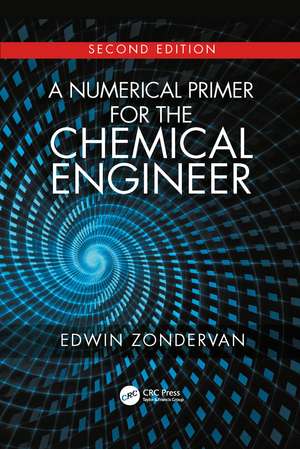A Numerical Primer for the Chemical Engineer, Second Edition
Autor Edwin Zondervanen Limba Engleză Paperback – 30 iun 2021
| Toate formatele și edițiile | Preț | Express |
|---|---|---|
| Paperback (1) | 305.39 lei 3-5 săpt. | +19.13 lei 6-12 zile |
| CRC Press – 30 iun 2021 | 305.39 lei 3-5 săpt. | +19.13 lei 6-12 zile |
| Hardback (1) | 487.69 lei 6-8 săpt. | |
| CRC Press – 27 aug 2019 | 487.69 lei 6-8 săpt. |
Preț: 305.39 lei
Preț vechi: 381.74 lei
-20% Nou
Puncte Express: 458
Preț estimativ în valută:
58.44€ • 62.49$ • 48.72£
58.44€ • 62.49$ • 48.72£
Carte disponibilă
Livrare economică 27 martie-10 aprilie
Livrare express 12-18 martie pentru 29.12 lei
Preluare comenzi: 021 569.72.76
Specificații
ISBN-13: 9781032090221
ISBN-10: 1032090227
Pagini: 208
Ilustrații: 64 Illustrations, black and white
Dimensiuni: 156 x 234 x 11 mm
Greutate: 0.3 kg
Ediția:Nouă
Editura: CRC Press
Colecția CRC Press
Locul publicării:Boca Raton, United States
ISBN-10: 1032090227
Pagini: 208
Ilustrații: 64 Illustrations, black and white
Dimensiuni: 156 x 234 x 11 mm
Greutate: 0.3 kg
Ediția:Nouă
Editura: CRC Press
Colecția CRC Press
Locul publicării:Boca Raton, United States
Cuprins
1. The role of models in chemical engineering. 2 Errors in computer simulations. 3 Linear equations. 4 Elimination methods. 5 Iterative methods. 6 Nonlinear equations. 7 Ordinary differential equations. 8. Numerical integration. 9. Partial differential equations. 10. Data regression and curve fitting. 11. Optimization. 12. Basics of MATLAB. 13. Numerical methods in Excel. 14. Case studies.
Notă biografică
Edwin Zondervan was born and raised in Leeuwarden, the Netherlands. After finishing his bachelor with a specialization in process automation in Leeuwarden he continued in Groningen with a M.Sc. in chemical engineering. Then he moved To Enschede and pursued a Ph.D. on modeling, optimization and control of dead-end membrane filtration of surface water. He defended his doctorate at Groningen in 2007. He worked from 2007 to 2015 at Eindhoven University of Technology. He has been working as associate researcher at the laboratories of Technical University of Catalonia, Carnegie Mellon University, Denmark Technical University and Imperial College . Besides research Edwin Zondervan has been very active in the educational gremials where he trained many generations of students in process design, process control and numerical methods. For the latter one Edwin published a textbook that was released in 2014: “A numerical primer for the chemical engineer”. Recently Edwin Zondervan joined the Institute for environmental science and Technology of Bremen University, where he obtained a professorship in “Process Systems Engineering”. The newly established Laboratory of Process Systems Engineering (PSE) at Bremen University (which was established within Bremen’s Excellence Initiative) will conduct research in the field of sustainable and flexible system design of energy networks. The main objective of the laboratory of PSE is to develop network modeling techniques and dynamic optimization tools and to apply them to the design and operation of complex energy/process systems. The PSE group distinguishes two working areas: i) Novel energy technologies and devices and ii) Energy Efficient production. Where the challenges lie in 1) decisionmaking under uncertainty, 2) sustainable design and 3) managing complexity. In addition the PSE group will be active in the development of an Energy Systems Institute at Bremen University and setup a specialized course program in this field.
Descriere
This book applies actual numerical solution strategies to formulated process models to help identify and solve chemical engineering problems. Second edition comes with chapter on numerical integration and sections on boundary value problems, general modelling principles, mass/energy balances and separate section on DAE’s.
